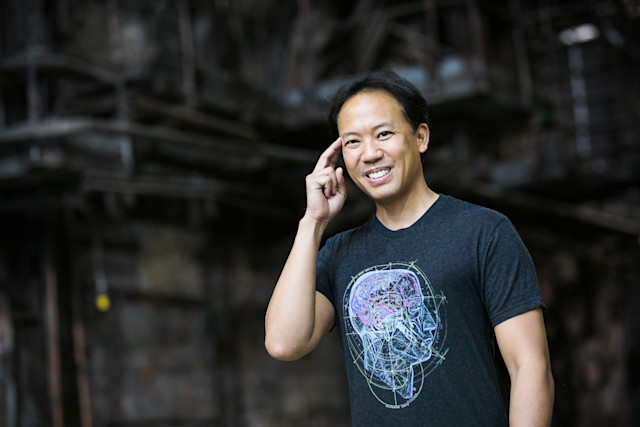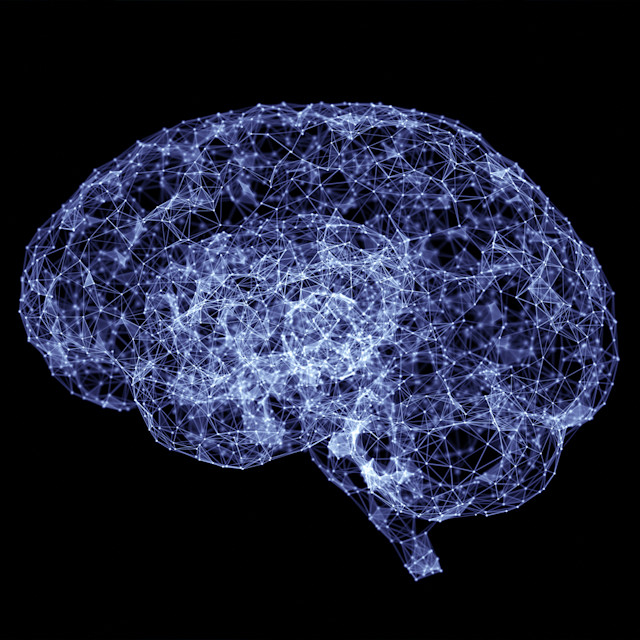Brain aging is one-thirds inevitable and two-thirds optional, says leading brain coach Jim Kwik.
This year, the Baby Boomer generation hits a retirement peak, with more adults turning 65 between now and 2027 than ever before in American history. Whether or not you’re near what’s being called the “silver tsunami,” there’s a good chance watching your parents, grandparents, or older siblings age has prompted you to reflect on your own cognitive functioning. After all, what’s a sharp body or a full retirement account with a dull mind? Even if you’re closer to half the retirement age, you may be feeling your skills slip away regardless, thanks to the smartphone glued to your hand and the laptop perpetually shining into your eyeballs.
The good news? To a certain degree, brain aging is optional. Take it from Jim Kwik, who’s built an empire around helping others cultivate better brain health, including his New York Times best-selling book, “Limitless,” and podcast, Kwik Brain.
“Your brain is an organ but it acts more like a muscle, and it's use it or lose it,” says Kwik. While some brain changes are inevitable as you age, there’s still a lot within your jurisdiction. “We know about one-third of brain performance is genetic, but two-thirds is in our control. As we age, it’s natural to experience changes in our brain function, and these changes are just part of the aging process, but it's also true that our lifestyle, choices, and habits can significantly influence our brain health and performance over time."
Kwik is living proof that, if you put in the work, your brain can change for the better. He experienced a traumatic brain injury at age five and was left with focus, concentration, and memory issues that plagued him into his college years. One day, a friend of his father (who soon became a mentor) introduced him to a life-changing shift in perspective: It wasn’t that he couldn’t learn, it’s that he needed to learn how to learn.

That experience laid the groundwork for Kiwk’s later professional success. Not only did the self-taught expert “rebuild” his own brain, but he’s made a living teaching others (including the likes of Harvard students and executives and employees from Google, Nike, and the United Nations) how to do the same.
Your brain is an organ but it acts more like a muscle, and it's use it or lose it.
They’re big promises, yes, and the truth is that you can’t hack your brain as much as you can’t hack anything else when it comes to health. Optimizing your grey matter comes down to a collection of core habits that benefit your mind and body as a whole. They’re practices you probably already do — or know you should. Here, Kwik breaks down the keys to staying sharp as you age, and why your attitude makes all the difference.
1. Physical Exercise — the Right Kinds
It’s good for everything else, and your brain, too. “Physical activity is the cornerstone for maintaining and improving brain health and performance,” Kwik says. “There's extensive research underscoring the benefits regardless of your age.” When it comes to the type of exercise, a mix is best (and that’s true for your brain as well as the body holding it up).
Cardio pumps blood and oxygen to your brain, aids in the creation of new brain cells, and promotes the release of dopamine, serotonin, and endorphins — neurotransmitters critical for cognitive health and performance, Kwik says. “Studies also show that regular aerobic exercise can increase the size of the hippocampus, which is the part of your brain involved with memory and learning, and it also has this protective effect against cognitive decline,” he adds.
Meanwhile, strength training has been linked to improvements in executive function, memory, and processing speed, and it may help boost levels of brain-derived neurotrophic factors (BDNF), Kwik says. That’s a protein that supports the growth and survival of brain cells, and decreased levels of it is linked to neurodegenerative diseases, such as Parkinson's and Alzheimer's.
Mind-body exercise can be powerful for reducing stress, depression, and anxiety, and promoting mindfulness and connection to breath, Kwik adds. Activities like table tennis, dance, or martial arts also boost your overall cognitive function, reaction time, and thinking speed, and it can help bring in habit number six: social connections. The ideal fitness routine isn’t only consistent but has a bit of everything for your brain and body’s sake.
2. Mental Stimulation
In addition to a to-do list, consider a to-learn list, Kwik suggests. “Your brain is the ultimate adaptation machine. The way you grow your physical muscles is to give them novelty and nutrition. The same is true for your mental muscles,” he says. Make learning a lifelong pursuit, and engage in mentally stimulating activities — whether you’re practicing a new language, doing puzzles, or mastering a hands-on hobby — on the regular.
Kwik’s personal favorite learning tool: reading. “I view it as the baseline activity to keep your brain sharp,” he says. For one, reading is an incredible exercise for focus — something it feels more of us are lacking every day, thanks to the high-speed nature of our lives and seconds-long entertainment on social media. Nonfiction reading offers obvious learning perks. Take an industry leader’s memoir, for example; you can “download” their lifetime’s worth of knowledge in just a few hours. But fiction reading may improve your emotional quotient (your ability to understand and manage your emotions in positive ways) and increase empathy, as well as stretch your imagination and creativity, Kwik says.
RELATED: Can Doodling be Therapeutic?
3. A Nutrient-Rich Diet
Need one more reason to eat more fruits and veg? A nutrient-rich diet is vital to your brain health in the same way it helps everything else in your body run smoothly. Namely, antioxidants, healthy fats (like omega-3 fatty acids), vitamins, and minerals, Kwik says. Get them in fatty fish, nuts and seeds, and colorful produce.
4. Quality Sleep
You already know sleep is important, but that only doubles down where brain health is involved. “Poor sleep patterns can affect your memory, learning, and emotional regulation,” Kwik says. And when you sleep, the “sewage system” in your brain kicks on to clean out the beta-amyloid plaque, Kwik says — a build-up of which is a hallmark sign of Alzheimer’s disease.
5. Stress Management
“Science shows that chronic stress will actually shrink your brain,” Kwik says, this can impact your memory and executive functioning. Creatives, in particular, may feel this acutely: Deadlines or make-or-break moments can inspire. Brief stressful circumstances can actually bloom new brain cells, according to research done in rats published in the journal eLife. But working under pressure day in and day out can quash the ability to think outside the box. “When you're stressed, you create cortisol and adrenaline and you're in that fight-or-flight mode, and it almost holds you hostage in your survival brain, keeping you away from your executive function, creativity, and problem-solving,” Kwik says.
6. Social Connection
You’ve seen it in the Blue Zones documentary, and you’ve heard it screamed in headlines: Meaningful social connections are the elusive missing piece for greater health and happiness. Yet, there’s still a “loneliness epidemic,” and society seems organized only to increase the divide. Brain health is another reason to push for it all the same. “Maintaining strong social connections and engaging in meaningful social activities can protect your brain from cognitive decline and improve your overall emotional being,” Kwik says.
RELATED: The Right Amount of Loneliness
A Word on Self-Talk
Your self-talk is just as instrumental in optimizing brain health as these six habits. If your brain is a supercomputer, those practices keep the hardware working well, but your self-talk is the software it will run, Kwik says. The human mind is infinitely changeable. You’re not pigeonholed into a certain way of being, and you’re not doomed with the tick of age. Believe you can’t, and you won’t.
Rewriting your internal dialogue is harder than you might imagine, but you can start to shift the narrative with a single word: yet. “If you find yourself saying, ‘I don't have a great memory,’ maybe, once you're aware of it, you could add a little word at the end: ‘I don’t have a great memory yet,’” Kwik says, “and it just opens up the possibilities.”
Photo courtesy of Jim Kwik
